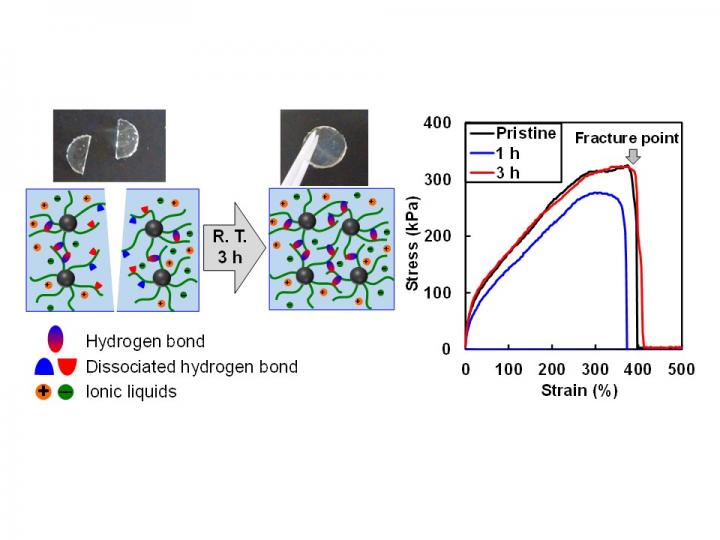The future of electronic devices: Strong and self-healing ion gels

The ion gel exhibits fast self-healing ability at room temperature by reforming hydrogen bonds at the damaged surface. The fracture stress of the ion gel after healing 3 h is comparable to that of the pristine ion gel. Credit: Yokohama National University
Ion gels have attracted much attention due to their unique properties such as low tendency to evaporate at room temperature, high thermal stability and a high ionic conductivity. The researchers demonstrated an ion gel that quickly heals on its own without any external stimuli at room temperature. They also demonstrate the material's excellent toughness resulting from multiple hydrogen bonds within the material.
“Wearable electronic devices are expected to be stretched and bent many times during daily use,” said Ryota Tamate, a corresponding author and a JSPS postdoctoral researcher at the Graduate School of Engineering, Yokohama National University. “If the ion gel used in the wearable device has a self-healing property, it may fix cracks and damages during the repeated stretching and bending, and improve the device's durability.”
The study, published in Advanced Materials in July of 2018, describes a specific type of polymer gel, called the ion gel, that is filled with salts in liquid form, or ionic liquids. This ion gel was created by combining two materials, or “blocks” — one is repelled by ionic liquids while the other bonds with hydrogen. Together, they form what is called a diblock copolymer.
The combination of the liquid salts and the diblock copolymer material resulted in a final micellar structure that is responsible for all of the material's desirable qualities. The block that is repelled by ionic liquids makes up the core, while the outside is composed of chains that interact with one another via multiple hydrogen bonds.
The study is the first demonstration that the introduction of hydrogen bonding into ion gels can result in the material's strength as well as its ability to self-heal at room temperature.
“The self-healing process of this ion gel can be completed as quickly as within a few hours,” Tamate said.
“Hydrogen bonding is reversible, and as a result, it is a promising interaction that contributes to a material's ability to self-heal due to their reversible nature. In this study, by tuning the hydrogen bonding strength of polymer chains in ionic liquids, we utilized hydrogen bonding as a reversible cross-linking point of the ion gel. Furthermore, we proved that the micellar structure formed by the diblock copolymer material significantly improved the physical strength and self-standing ability of the ion gel,” he added.
While several types of tough ion gels have been reported so far, the authors write that achieving both self-healing ability as well as high toughness remains a great challenge. They also report that their gel's mechanical and electrochemical properties were similar to those of an otherwise unaltered or unchanged ion gel. The material's self-standing ability, the fact that it can self-heal at room temperature as well as easily processed in solution all make it a promising solid electrolyte for future applications in the area of flexible electronics – in particular to create self-healing electronics.
According to Tamate, “For device applications, durability of the ion gel under various physically straining conditions should be quantitatively investigated. In addition, as the present diblock copolymer tends to absorb moisture from the air, we would like to seek other interactions between structures composed of several molecules that are stable in an open atmosphere for a long time. In addition, as physical properties of ionic liquids can be widely tuned by selection of cations and anions, the combination with different ionic liquids will be investigated.”
Ultimately, the authors would like to develop new functional ion gels that can be used to create new devices that are flexible and thus wearable.
###
Yokohama National University (YNU or Yokokoku) is a Japanese national university founded in 1949. YNU provides students with a practical education utilizing the wide expertise of its faculty and facilitates engagement with the global community. YNU's strength in the academic research of practical application sciences leads to high-impact publications and contributes to international scientific research and the global society. For more information, please see: http://www.
Media Contact
Akiko Tsumura
kenkyu-kikaku@ynu.ac.jp
81-453-393-213
Media Contact
More Information:
http://dx.doi.org/10.1002/adma.201802792All latest news from the category: Materials Sciences
Materials management deals with the research, development, manufacturing and processing of raw and industrial materials. Key aspects here are biological and medical issues, which play an increasingly important role in this field.
innovations-report offers in-depth articles related to the development and application of materials and the structure and properties of new materials.
Newest articles

Silicon Carbide Innovation Alliance to drive industrial-scale semiconductor work
Known for its ability to withstand extreme environments and high voltages, silicon carbide (SiC) is a semiconducting material made up of silicon and carbon atoms arranged into crystals that is…

New SPECT/CT technique shows impressive biomarker identification
…offers increased access for prostate cancer patients. A novel SPECT/CT acquisition method can accurately detect radiopharmaceutical biodistribution in a convenient manner for prostate cancer patients, opening the door for more…

How 3D printers can give robots a soft touch
Soft skin coverings and touch sensors have emerged as a promising feature for robots that are both safer and more intuitive for human interaction, but they are expensive and difficult…





















